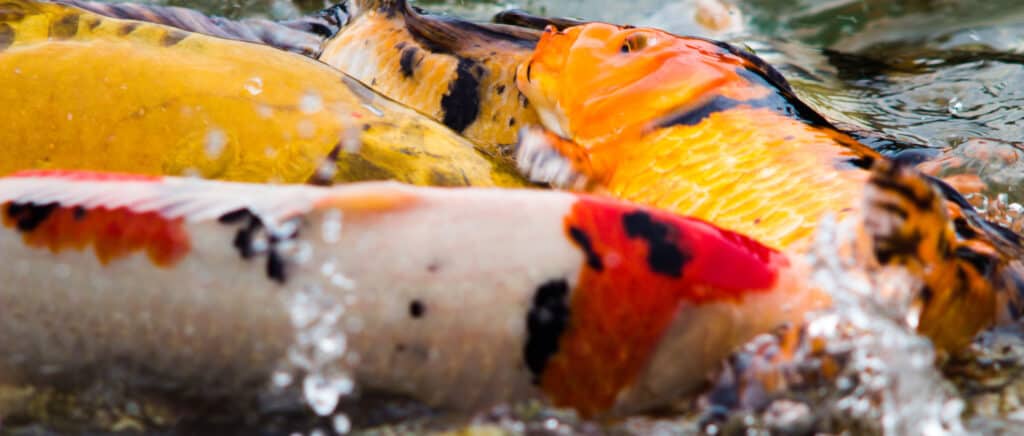
Koi are among the most popular pond fish for their striking beauty. So perhaps you are considering adding koi to your pond too. Nevertheless, before you add the fish to your pond, you may be asking yourself one critical question, ‘are koi aggressive?’
Koi are not aggressive fish. Typically koi are calm and have even been described as friendly. However, koi can become aggressive under certain conditions. Hunger, stress, temperament, injuries, and breeding season can make koi aggressive. Thus, it’s important to regularly check the koi’s conditions.
Discover what makes koi aggressive and how you can prevent aggression by reading on. When it comes to getting koi, there are definitely things you need to know.
Pro Tip: If you’re tired of wasting money and making costly mistakes on the koi-keeping hobby or are thinking about buying koi fish but don’t know where to start, I strongly suggest you check out this ebook. I recently read this ebook, and it contains SO much useful information, such as:
- 3 proven steps to identify koi fish diseases
- WARNING: 3 things you should NEVER do when it comes to caring for koi
- When to seek professional help when it comes to looking after your koi
Are Koi Fish Aggressive?
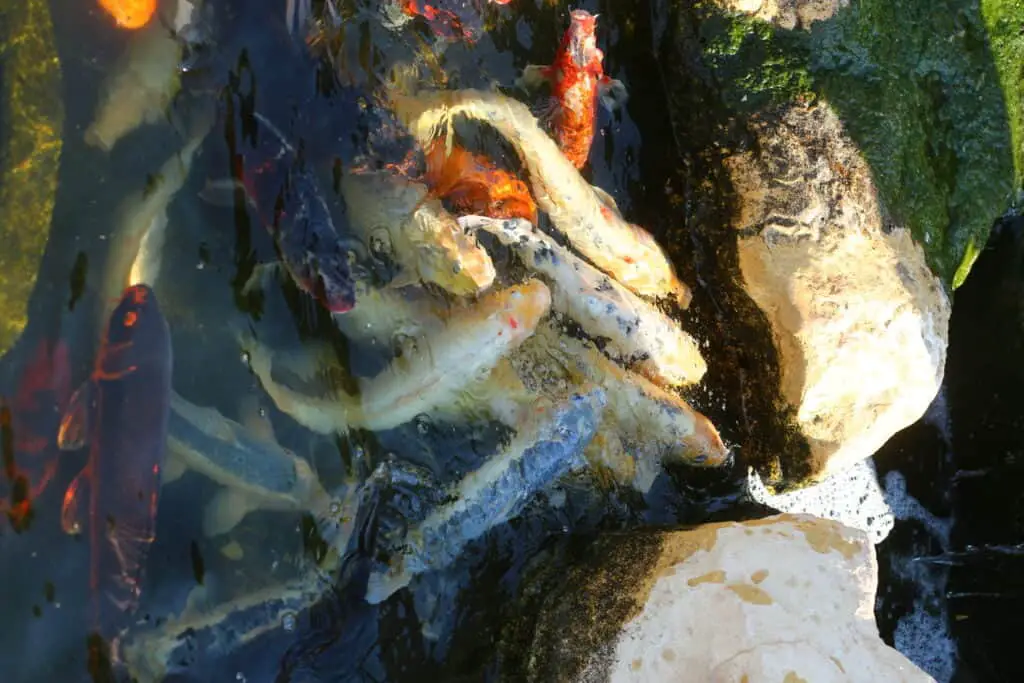
Koi fish are one of the most strikingly beautiful fish species due to their vivid colors and unique patterns. As a result of their eye-catching colors, these fish have become a favorite among pond owners, making them one of the most popular pond fish available.
If you are one of the many pond owners considering introducing koi to your beloved backyard pond, you may be curious about how friendly this popular fish species is. Knowing the temperament of any new fish species is necessary, as aggressive fish can cause havoc in your already-peaceful tank by attacking and bullying other fish.
In addition, the presence of aggressive fish can deter you from adding new fish to your pond for fear that they might attack the new fish – and rightly so. So are koi fish aggressive? Not at all. Koi fish are considered peaceful and gentle.
According to some cultures, the koi symbolizes harmony, among other traits such as strength, perseverance, and good fortune. However, although these respectable fish are considered peaceful, they are not always the angels of the pond.
Under certain circumstances, koi can act in aggression towards other fish. Fortunately, you can change some of these circumstances to restore the peaceful behavior of your koi.
On the other hand, unfortunately, some factors affecting your koi fish’s aggression can’t be changed. Therefore, it is best to inform yourself about what might cause koi fish to be aggravated before introducing them to your pond – prevention is always better than cure.
Are Koi Aggressive To Goldfish?
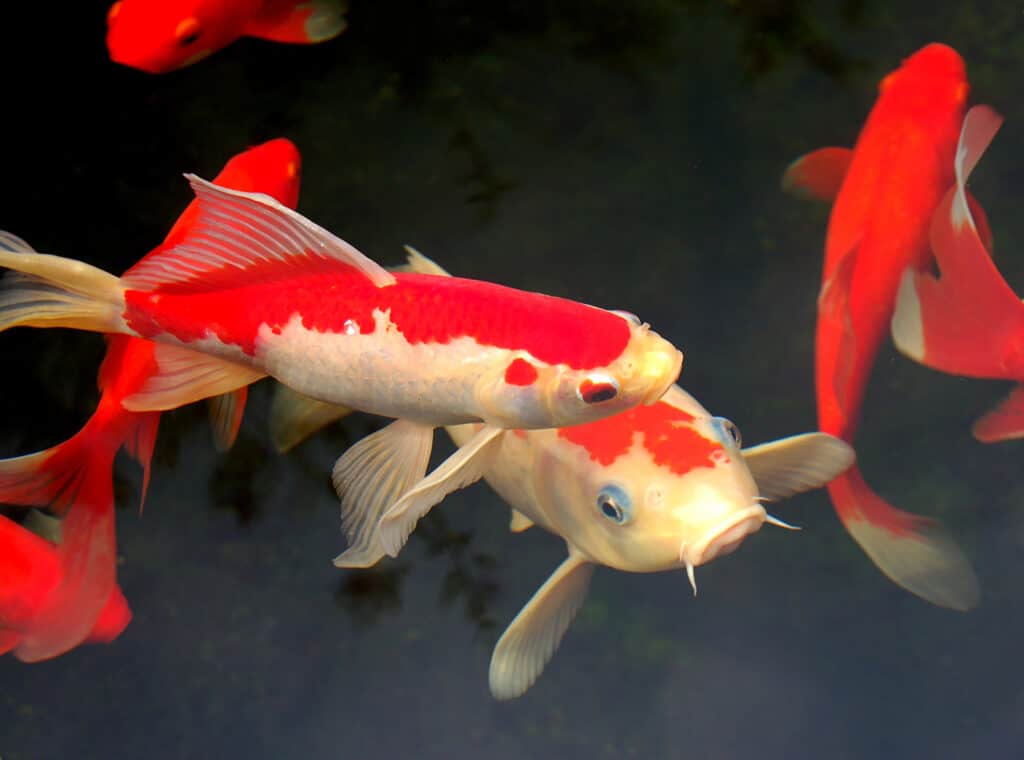
Since big fish tend to be aggressive toward other fish, you might assume the same applies to koi. Despite our previous discussion regarding the gentle nature of the koi, this assumption does ring somewhat true. Koi fish, while generally peaceful, have been known to act aggressively toward certain types of fish.
For instance, while many people report that their koi and common goldfish live in peace, the same is not true for koi and fancy goldfish. For some reason, koi fish do not seem to get along with fancy goldfish. It is not unusual for koi to bully fancy fish.
Koi frequently chase fancy goldfish and might nip at their tails or even attack the goldfish’s eyes. In rare cases, the aggressive behavior of the koi might lead to the goldfish’s death. It is essential to separate these two types of fish and never keep them together. Even temporarily.
On the other hand, common goldfish seem to get along slightly better with koi. As a result, many pond owners report that their koi and goldfish live harmoniously. However, this ‘harmonious’ living is only true if certain precautions are taken. The main precaution is to make sure the goldfish is not too small.
The goldfish must be full size or big enough not to be eaten. While koi may not be aggressive towards goldfish, you must remember that koi are omnivorous feeders. This means that koi will not just eat fish flakes or scraps of lettuce or peas; they will also eat worms, insects, larvae, fry, or even tiny fish if they have the chance.
So if the goldfish is small enough to fit inside the koi’s mouth, it will most likely become the koi’s next meal. So it is best not to keep the two fish in the same pond. When introducing koi and goldfish simultaneously, remember that koi grow larger and faster than goldfish.
When it comes to food, koi can be a competitive bunch. Because goldfish are smaller than koi, the koi might always get the first pick of the flakes, leaving nothing for the goldfish. So always keep an eye on whether your goldfish can eat and provide enough flakes so that both the koi and goldfish can eat.
Are Koi Aggressive To Humans?
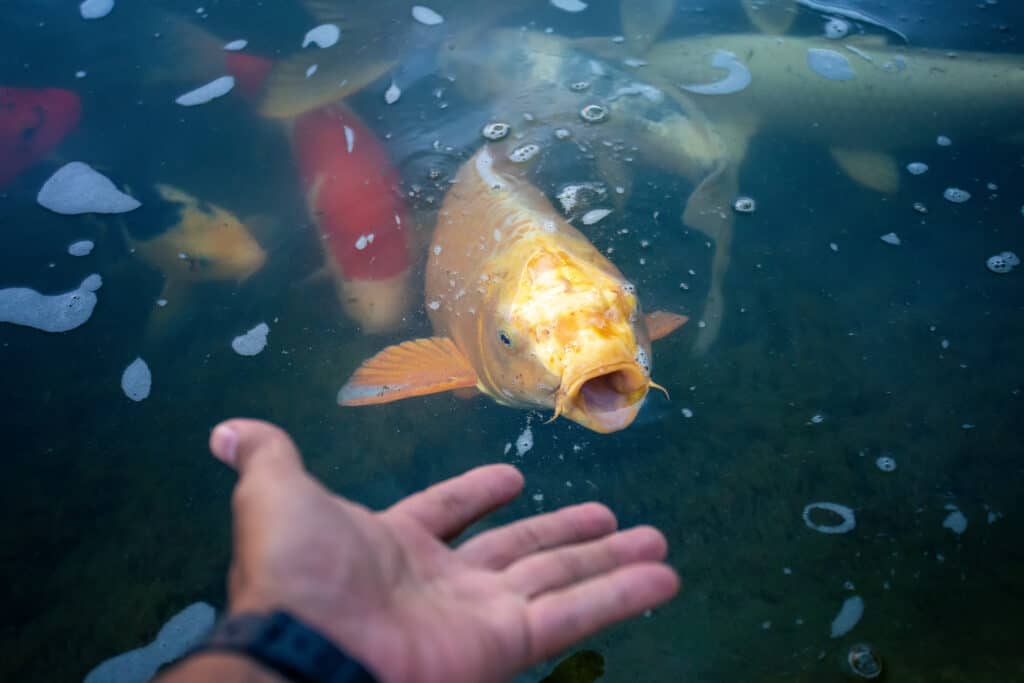
While some fish species can be aggressive towards humans, koi are not one of them! Some koi have even developed quite a special bond with their owners and have been described as an overall friendly species. Some koi even allow their owners to pet them.
Yes, these fish like to be petted or have their belly stroked, just like some domestic pets (you certainly can’t say that about other fish). The trust that some koi have with their owners is remarkable as these fish will even swim into the outstretched palm of their owners (who said fish could not make good pets?).
However, this level of friendliness or trust is not given to merely anyone. Before the koi fish can trust them to that extent, there must be a bonding relationship between the owner and the fish. If you are a stranger and koi refuse to eat from your hand, that’s okay. It’s only wise to be a little cautious of strangers.
And koi, like most fish, hold to this motto. If you want koi to trust you enough to eat out of your hand, it will take some time and dedication. Firstly, you will need the koi to get used to your presence. So to do this, feed the koi some tasty, familiar treats at the same time every day for several days.
While doing this, sit very still by the pond while the koi are eating. Once the fish have been accustomed to your presence, slowly bring your hand into the water with pellets.
The hungriest or the bravest should try to eat the pellets first. Once the pellets are done, repeat the process slowly several times. Continue this process daily to gain more of the koi’s trust.
Why Are Koi Aggressive?
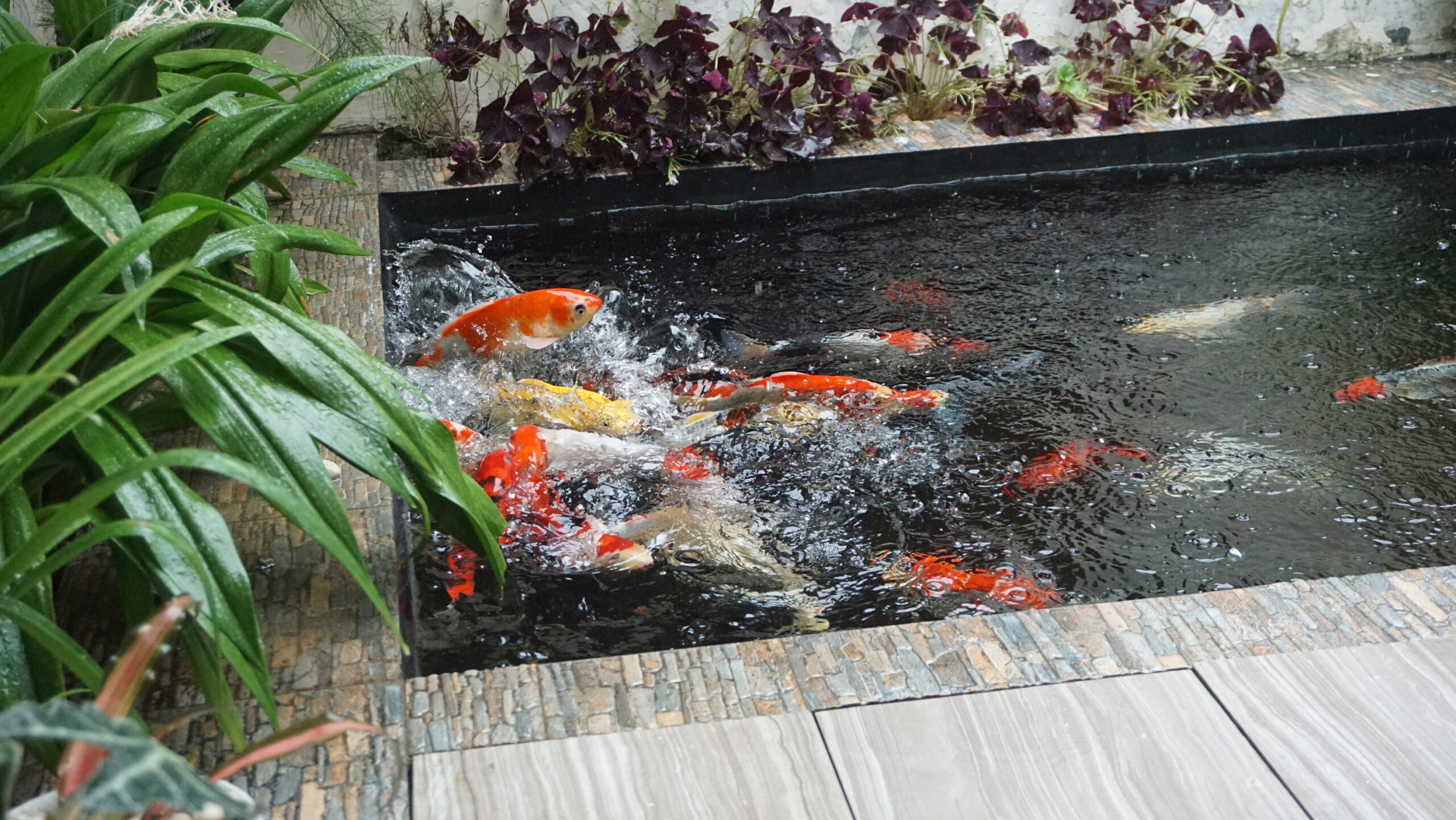
Although koi are generally calm fish, they can be aggressive under certain circumstances. Below we will examine the possible reasons koi could act aggressively.
Hunger Can Lead To Aggression
When you are hungry, you might be irritable, agitated, or snappy with others. Otherwise known as ‘hangry,’ fish can feel this feeling too – and koi are no exception.
Hungry koi can act more aggressively and might even take out their frustrations on other fish. You may also notice that koi push other fish out of their way to get to the food. A lack of nutrition can also cause the koi to act out aggressively.
So be sure to feed your koi high-quality food with plenty of nutritional value. A Koi’s diet should include protein, healthy fats, carbohydrates, and vitamins and minerals. A proper nutritious diet is essential in keeping your koi happy and healthy.
Overcrowding Can Cause Aggression
When you have too many koi and too little space, it can spell disaster. Koi need plenty of room to swim around and should not be overcrowded. If koi are crowded, they can become territorial and compete for food and space. Overcrowding can also mean that your carp are more susceptible to infections caused by injuries.
A pond with too many koi can also affect water quality, producing more waste, encouraging algae growth. So, it’s crucial to provide sufficient space for your carp. More space means that the koi will be happier and healthier.
Breeding Season Can Cause Aggression
During the breeding season, koi can get more aggressive than usual. Male koi will be aggressive towards other males as they compete for the female’s egg. In addition, male koi often behave aggressively by biting or shoving other males, which can result in injury.
Male koi may also appear to shove or push female koi, but this behavior isn’t necessarily aggression. Shoving the female is done to help release the egg for fertilization. So, if you see behavior that is out of the norm during the breeding season, don’t worry. It is just the circle of life.
Stress Can Cause Aggression
Did you know that koi can be affected by stress? The stress of koi may not be the same as that of humans, but it can still affect the fish just as much. Stress can result from overcrowding, poor water quality, poor diet, water temperature changes, or the presence of predators.
Unfortunately, stress can make your koi more susceptible to illness or disease, so it is always essential to constantly check on the health of your koi. Be sure to check all the various risk factors of stress, such as the water condition and overcrowding.
Temperament Can Cause Aggression
Koi have their own personality traits. For example, some might be more cautious, some braver, and others more aggressive. If you have checked all possible causes for your koi’s aggression – to no avail – you may have a naturally dominant or aggressive fish.
Injury Can Cause Aggression
When koi are injured, they can lash out at other fish. This lashing out may be a defensive mechanism to protect itself from further harm. Check for injuries if you notice any changes in your koi’s movements or behavior. The sooner you treat injuries, the better.
How To Make Koi Less Aggressive
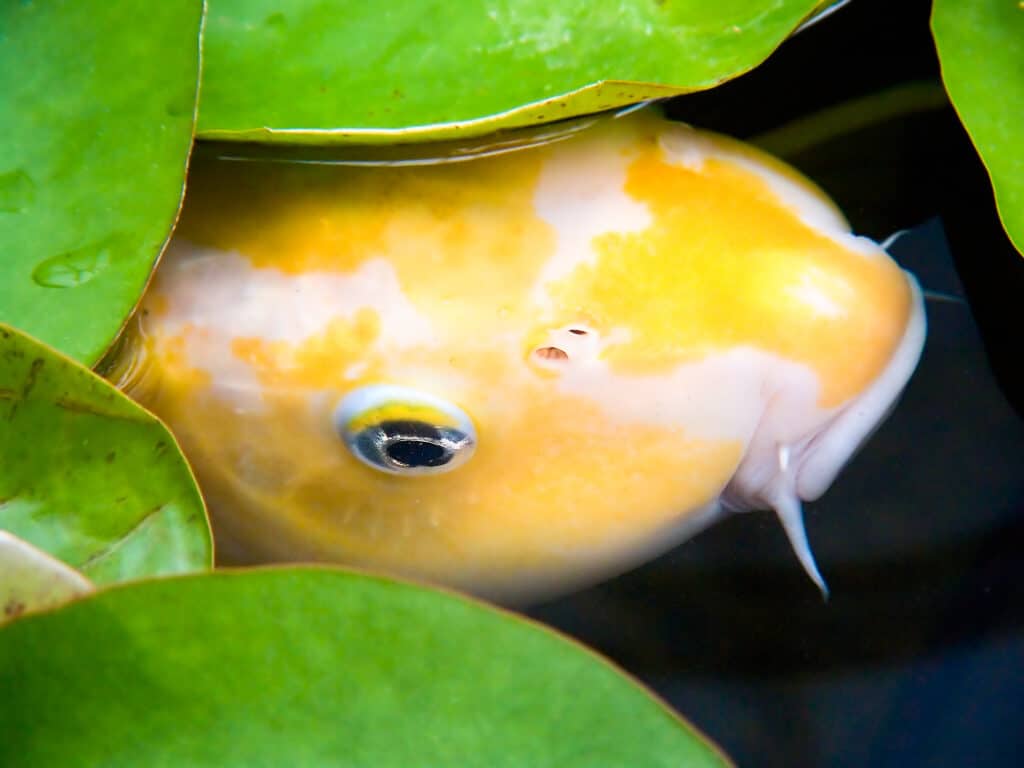
If you have naturally aggressive fish, the best option is to place the aggressive fish into a different pond. Additionally, you can help shy koi or koi that are bullied by providing lots of plants in the pond.
Plants will enhance the pond’s appearance and provide a valuable refuge for fish that want to hide or get away from bullies. You can also invest in artificial koi shelters.
These shelters are specifically designed to be big enough for koi and can provide a safe and secure hiding space for koi. Also, try to ensure that all the koi living conditions are correct. For instance, try to ensure your carp is not under any stress due to water conditions or changes in temperature and being well-fed.
If your koi are stressed because of predators, be sure to add predator repellent. Hawks, cats, and raccoons would love to get their paws (or beak) on your koi fish. Of course, we never want to hurt or injure the predators; we want to make it so that it is harder for them to reach the koi.
For instance, you can place a net over the pond so birds cannot scoop up your koi. Additionally, be sure to check the health of your koi regularly. Doing a regular inspection can help prevent illness or injuries from worsening, which can help prevent aggression.
Conclusion
Koi are generally not considered aggressive fish. In fact, koi are considered synonymous with gentleness and harmony in some parts of the world. Koi tend to get along with most other fish. However, some fish species that koi do not get along with, such as fancy goldfish.
Also, if koi are pond mates with smaller fish, they may eat them. So it is always important to pair your koi with compatible bigger fish that can live in the same water conditions. Additionally, koi can have aggressive behavior under certain conditions. So be sure to make sure ensure your koi are well-fed, stress-free, and healthy.
Despite all your efforts, some koi may still act aggressively. This is because their temperament may be more aggressive or dominant than others, regardless of the conditions. In the end, koi have needs and requirements like most fish species. Koi fish are definitely worth considering for your pond.
References
https://pethelpful.com/fish-aquariums/Top-5-Benefits-Youll-Get-From-Owning-Pet-Koi


